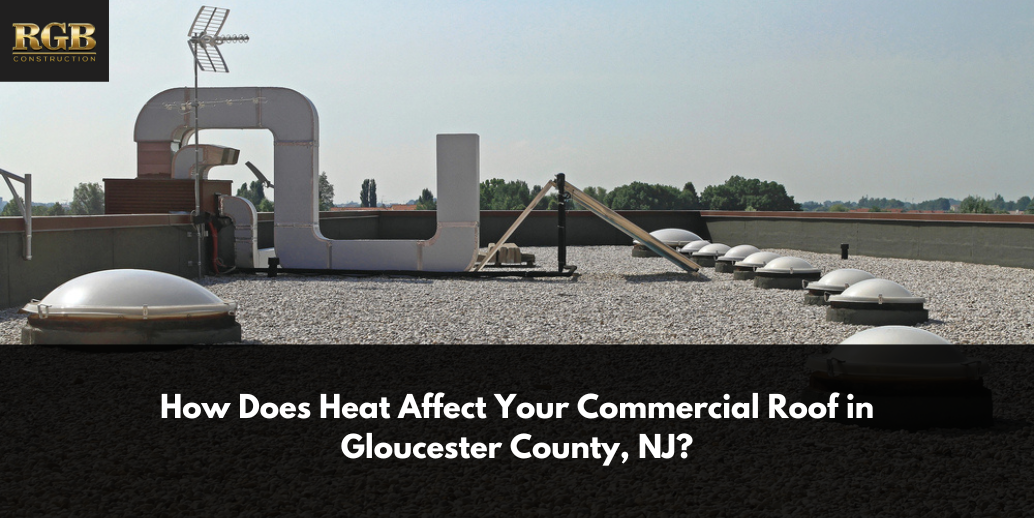As temperatures soar in Gloucester County, NJ, the scorching heat can take a toll on commercial roofs. Commercial properties are usually the ones that bake in the sun throughout the day, due to a lack of tree cover. Understanding how heat affects your roof and taking proactive measures can help you avoid costly damage and ensure the longevity of your investment. Let’s take a look at the commercial roofing materials most impacted by the sun and what can happen when the heat becomes too intense. At the end, you will also learn some possible ways to protect your roof better.
What Are Commercial Roofs in NJ Made Of?
Commercial roofs in New Jersey are constructed using a diverse range of materials, carefully selected based on various factors such as climate, building design, and budget considerations. Here’s a closer look at some common materials used in commercial roofing:
Asphalt
Asphalt roofing systems consist of layers of asphalt-saturated fiberglass or organic felt. These roofs are cost-effective and relatively easy to install, making them a popular choice for commercial properties. However, asphalt roofs may be prone to damage from UV exposure and require regular maintenance to prolong their lifespan.
Metal
Metal roofing is renowned for its durability, longevity, and low maintenance requirements. Typically made from steel, aluminum, or copper, metal roofs offer excellent resistance to fire, wind, and impact damage. They are also highly reflective, helping to reduce energy costs by keeping buildings cooler in the summer.
EPDM (Rubber)
Ethylene Propylene Diene Monomer (EPDM) roofing membranes are synthetic rubber materials known for their exceptional weather resistance and flexibility. EPDM roofs are lightweight, cost-effective, and easy to install, making them a popular choice for flat or low-slope commercial roofs. However, they may be susceptible to punctures and require regular inspections and maintenance to prevent leaks.
TPO (Thermoplastic Polyolefin)
TPO roofing membranes are single-ply membranes made from a blend of polypropylene and ethylene-propylene rubber. TPO roofs offer excellent resistance to UV radiation, ozone, and chemical exposure, making them a durable and energy-efficient option for commercial properties. They are also highly reflective, helping to reduce cooling costs and enhance indoor comfort.
PVC (Polyvinyl Chloride)
PVC roofing membranes are made from polyvinyl chloride resin and plasticizers, offering excellent durability, chemical resistance, and fire retardancy. PVC roofs are highly flexible and resistant to UV radiation, making them suitable for various commercial roofing applications. They also have a long service life and require minimal maintenance, making them a cost-effective option for building owners.
What Are The Signs of Heat Damage to a Commercial Roof in Gloucester County?
Heat damage to a commercial roof in Gloucester County can manifest in various ways, indicating potential issues that require attention. Some signs of heat damage to watch out for include:
- Cracked or Buckled Roofing Materials: Prolonged exposure to high temperatures can cause roofing materials such as asphalt shingles, membranes, or metal panels to become brittle and crack. In some cases, the materials may buckle or warp, compromising their structural integrity and waterproofing capabilities.
- Blistering: Heat can also lead to blistering or bubbling of the roof surface, particularly in areas where moisture has become trapped beneath the roofing material. These blisters can weaken the roof’s protective barrier and create vulnerabilities that may result in leaks or other forms of water damage.
- Fading: UV rays from the sun can cause roofing materials to fade and lose their color over time. Fading not only affects the aesthetic appeal of the roof but also indicates potential damage to the surface layers of the material, reducing its ability to reflect sunlight and heat.
- Increased Energy Costs: Poorly insulated roofs or those lacking reflective coatings can contribute to higher energy bills during the summer months. As the roof absorbs heat, it can transfer that heat into the building, forcing air conditioning systems to work harder to maintain comfortable indoor temperatures. This increased energy demand can result in higher cooling costs for commercial property owners.
How to Protect Your Commercial Roof From Summer Heat?
To protect your commercial roof from summer heat and minimize the risk of damage, there are specific things that can be done. The following measures are an excellent way to begin:
- Insulation: Ensure your roof is properly insulated to prevent heat transfer from the outside to the inside of the building. Adequate insulation helps regulate indoor temperatures and reduce the workload on HVAC systems, leading to energy savings and improved comfort for occupants.
- Cool Roof Coatings: Apply reflective coatings or cool roof membranes to your commercial roof to reduce heat absorption and minimize thermal stress. These coatings are designed to reflect sunlight and heat away from the building, helping to maintain lower roof temperatures and reduce cooling costs.
- Regular Maintenance: Schedule routine inspections and maintenance checks to identify and address any signs of heat damage or deterioration promptly. Addressing issues such as cracked or damaged roofing materials, blistering, or fading early can prevent further damage and prolong the lifespan of your roof.
- Shade Structures: Install shade structures, such as awnings, pergolas, or shade sails, to provide additional protection from the sun and reduce heat absorption by the roof surface. Planting trees or vegetation around the building can also offer natural shade and help lower ambient temperatures, reducing the strain on your roofing system.
Contact a Commercial Roofing Contractor in South Jersey Today
Don’t wait until summer heat takes its toll on your commercial roof. Contact RGB Construction, your trusted commercial roofing contractor in South Jersey, for expert solutions tailored to your specific needs. Whether you need roof repairs, maintenance, or a new installation, our team is here to help you protect your investment and ensure the longevity of your roof. Reach out to us today at 856-264-9093 or by filling out the online form to schedule a consultation and take the first step towards a resilient and energy-efficient commercial roof.







